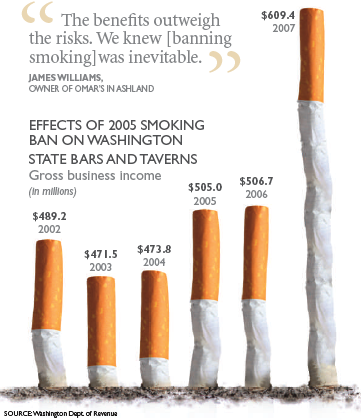With the statewide smoke-free workplace law looming, some businesses have decided to ditch their ashtrays early.
 UP IN SMOKE
UP IN SMOKE
With the statewide smoke-free workplace law looming, some businesses have decided to ditch their ashtrays early.
By Jason Shuffler
For Jim Eastridge, owner of Magoo’s Sports Bar in Salem, the decision to make his business smoke-free took months. After all, for 35 years he had been accommodating his smoking patrons.
In the end, Eastridge decided to prohibit smoking in his bar last September. It was a tough decision, but ultimately it just came down to business common sense. “I began to see some of my customers going to non-smoking places,” Eastridge says.
Sentiment toward smoke-friendly businesses in Oregon has changed as well. Last year lawmakers expanded the state’s Smokefree Workplace Law, banning smoking inside bars, restaurants and other businesses that were exempt from the original 1996 law. (Casinos and businesses on sovereign tribal land remain exempt.) Oregon joins 22 other states with similar laws that protect workers from secondhand smoke.
And now, just months before the new rule goes into effect on Jan. 1, 2009, some businesses across the state such as Magoo’s already have ditched their ashtrays and are adjusting, even as anxiety builds over how the law will impact long-standing customer relationships and business.
Just before Magoo’s went smoke-free, Eastridge consulted a long-time customer and smoker about it. She was supportive and even helped him write a press release declaring his intent to snuff out smoking in his bar. He sent it to the Statesman Journal and the next day it appeared on the front page. (“It must have been a slow news day,” he says.)
Since then, Eastridge says he has lost some customers and his Oregon lottery and video poker sales have taken a hit, but his food and beverage sales have increased nearly 15%.
When Bart Caridio, owner of the Axe and Fiddle in Cottage Grove, opened his bar and music venue less than a year ago, the smoking question was one of his more important business decisions. “It would have been a bad business decision” to permit smoking, he says. “We are doing well as a non-smoking bar.”
According to the state-funded Tobacco Prevention and Education Program, 81% of Oregonians don’t smoke. And 87% say people should be protected from secondhand smoke. For many businesses, this fact has been the impetus for going smoke-free early, figuring that the best way to cope with the law in the long run is to cater to the majority of current and potential customers.
“The benefits outweigh the risks,” says James Williams, owner of Omar’s in Ashland. Opened in 1946, it’s the oldest lounge and restaurant in town. It went smoke-free last April. “We knew it was inevitable.”
Lottery and video revenue predictably fell, Williams says. Bar sales took an immediate hit, too. But 95% of his customers praised the new smoking policy, and since converting his bar, revenue is recovering because more customers are eating in the bar and staying longer.
 Jeff Plew also plans to be an early adapter as co-owner of Concept Entertainment, a group of bars, entertainment lounges and restaurants in Portland. “You gotta do it anyway, might as well get ahead of it,” he says.
Jeff Plew also plans to be an early adapter as co-owner of Concept Entertainment, a group of bars, entertainment lounges and restaurants in Portland. “You gotta do it anyway, might as well get ahead of it,” he says.
At first Plew was worried how the law might financially impact his business. So at the Thirsty Lion, one of his locations, he experimented by allowing smoking indoors only after 9 p.m. Customer response was positive, so now he doesn’t expect to take a significant hit.
The company recently opened Grand Central Restaurant and Bowling Lounge in Portland. Unlike at his other establishments, Plew doesn’t allow smoking there in anticipation of the new law. For his other locations he plans to build more outdoor patio space with chairs and tables to accommodate smoking customers.
The dance between business interests and workplace smoking laws in the state already has been through a rehearsal of sorts. In 1997, Corvallis was the first city in Oregon to pass an ordinance banning smoking in bars and restaurants. Eugene adopted a similar law in 2000.
In both cases the business community, with the help of the powerful Oregon Restaurant Association (ORA) lobby, forcefully pushed back. The Corvallis City Council ordinance was overturned but then later upheld by voters.
In Eugene, the run-up to the city ordinance fostered a war-like atmosphere between smoke-friendly establishments, workers and anti-tobacco groups. Some establishments felt the law would curtail their business. Bill Perry, ORA director of government affairs, argued then that such local laws were piecemeal and created an unfair business playing field throughout the state.
“We tend to be more free-market oriented,” Perry says of the more than 3,000-member association.
Natalie Frajola, co-owner of the Flight Deck Restaurant and Lounge in Salem, hopes a statewide law will bring back some of her customers who have gone elsewhere. Most of her 30 to 45 smoking clientele left, she says. “For us, that was a fairly big amount. We miss those customers.”
A supporter of the new rule, she went smoke-free in October because she was getting consistent complaints from nonsmoking customers. “It was a big deal when we stopped it,” she says.
Since then sales of wine and beer have dropped. Like Magoo’s, she has made up some of that lost revenue with a spike in food sales.
But she doesn’t miss the cleaning costs and the lingering smell of cigarette smoke. After the business went smoke-free Frajola gave the lounge a fresh coat of paint. Employees now seem healthier, she says, and are taking fewer sick days. One of her bartenders has even been able to quit smoking.
Health issues traditionally are the inspiration for smoking bans. Dana Kaye of the American Lung Association of Oregon says it has become absurd for businesses to challenge the detrimental effects of secondhand smoke on employees. “There has been a tipping point,” she says. “All of a sudden businesses realize the benefits of a non-smoking establishment.”
According to the Oregon Department of Human Services, secondhand smoke kills about 800 Oregonians each year. In 2004, the medical expenses and loss of worker productivity associated with tobacco use cost the state more than $2 billion.
Still, restaurant and bar owners want to know their business model is going to hold up under such laws. For Plew, studying how the workplace smoking bans affected Washington State and Corvallis put him at ease.
Washington’s restaurant and bar smoking ban went into effect in December 2005. In June of this year the state’s Department of Revenue stated that income for bars and taverns grew 0.3% in 2006, a full year after the ban began. In 2007, revenue jumped 20.3%. For restaurants, income has risen by at least 8% each year.
Corvallis’ smoking ban hasn’t proven to hurt business either. The Pacific Research Institute in Eugene looked at two years of sales data from Corvallis and nearby towns after the law went into effect in 1998 and there were no major disparities.
But at least in the short term, it seems the state treasury has more reason to be concerned. The Oregon Legislative Fiscal Office calculates the law will result in a $50 million drop in tobacco tax revenue between 2009 and 2011. Most of this income would normally help fund the Oregon Health Plan.
If it’s any indication from businesses that have gone smoke-free early, lottery and video poker revenue for the state will decrease as well. The state anticipates this, but to date lottery officials are unsure by how much.
Given some of these unknowns, not all businesses are rushing to eliminate smoking any earlier than necessary.
On any given day at the Ash St. Saloon in Portland the bar is filled with patrons sitting with pints of beer and a lit cigarette. With about half of her customers smokers, owner Trish Greenlee still allows smoking and has no plans to go smoke-free before Jan. 1. “It’s a bit of an infringement on personal freedoms,” she says.
But she is still preparing for the inevitable. She has renewed a contract allowing Camel cigarettes to be exclusively promoted at the bar. In return, she gets tables and umbrellas for outside. She may even get some outdoor propane heaters.
To comment, email [email protected].



